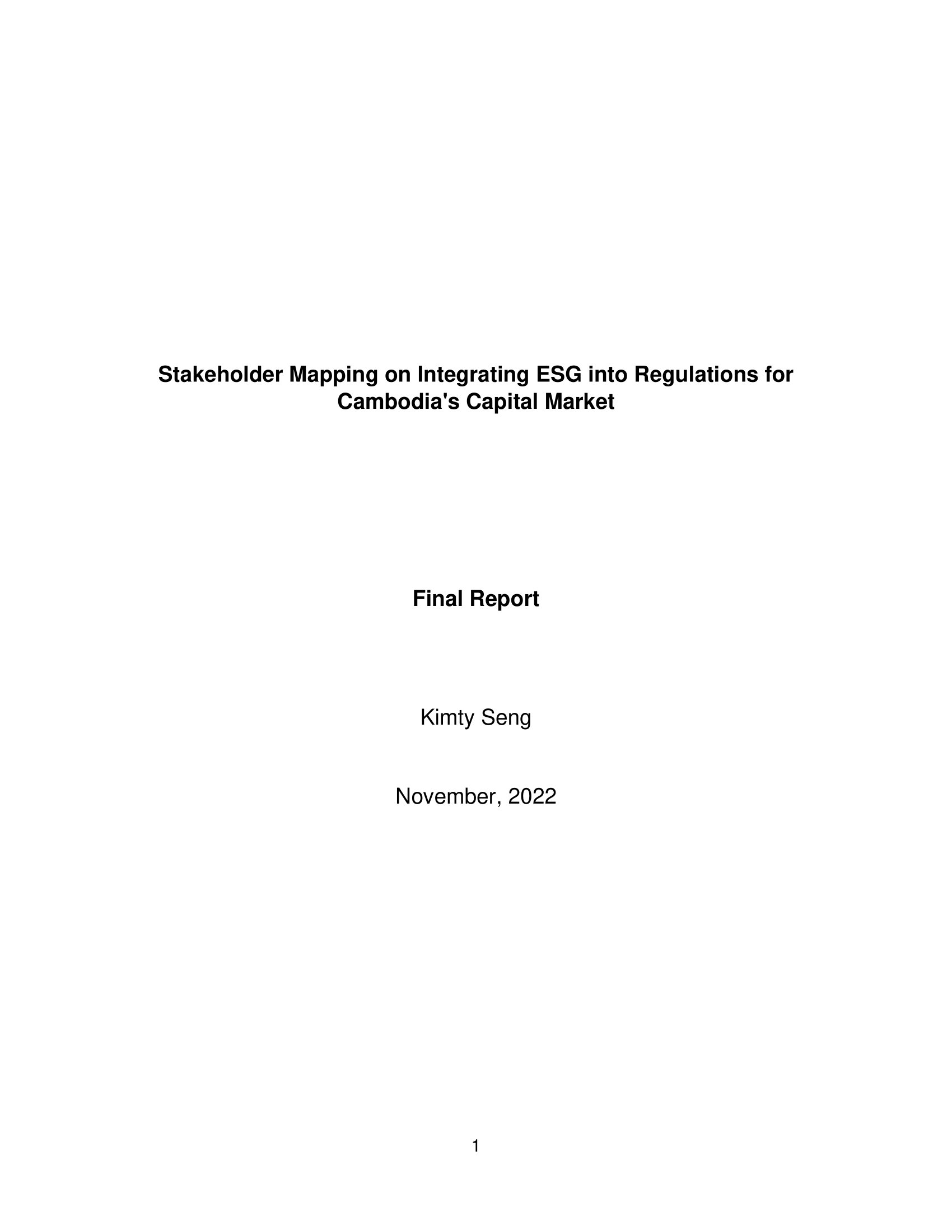
The main objective of this study was to examine and assess the roles and responsibilities of stakeholders in and major challenges of integrating ESG principles into regulations in Cambodia’s capital market. The study also suggests recommendations on promoting the adoption of ESG principles in the market for a consideration.
To promote investments in the production sector and diversify funding sources for those projects, Cambodia launched its capital market in 2010, aiming to speed economic growth and meet the Sustainable Development Goals (SDGs). In the context of sustainable development, the capital market allows the Kingdom to consider incorporating Environmental, Social, and Governance (ESG) principles into its functioning.
Nevertheless, the notions of ESG principles are new to Cambodia, especially in the securities sector, requiring a study on a roadmap to ESG adoption in the capital market. This study’s primary goal is to explore and evaluate the stakeholder roles and responsibilities and the most significant challenges to incorporating the ESG principles into Cambodia’s capital market rules.
This study utilises a qualitative approach to suggest that, as per current regulations, the SERC and CSX have significant roles to play in promoting the adoption of ESG principles in the capital market by incorporating them into securities regulations. Moreover, securities issuers (especially for debt securities), securities intermediaries, including underwriters, financial and investment advisors, and particularly institutional investors , are the key stakeholders in applying ESG principles to the issuance/listing of ESG securities. Although the current regulation requires social and governance principles on corporate governance for listed companies and listing rules, the environmental principles are yet to be imposed by the regulations.
The market’s current objective is to encourage qualified companies to list in the market, develop their trading mechanisms, gain experience, reach more public ears and populate the boards. Because the capital market is still in its infancy, there are worries that legally mandating the key stakeholders to follow the ESG standards will be a barrier to entry. However, other stakeholders are prepared to put the principles into practice whenever the rules specify. Recently, the regulator and CSX publicly demonstrated their commitment to encouraging the adoption of ESG in Cambodia’s capital market.
The study also reveals that different stakeholder perspectives on the current ESG implementation in the Cambodian market, high costs associated with applying the principles to ESG securities, and a lack of incentives all contribute to the potential challenges of integrating the principles into the securities regulations. Social and governance concepts are currently applied to the listed corporations, though not totally, as required by the current legislation.
The study also concludes that the following factors entail due consideration for incorporating ESG principles into the rules and oblige the major stakeholders to adopt them:
- The awareness of ESG standards , mainly when applied to the securities sector, among the capital market’s stakeholders;
- A clear masterplan for the development of ESG standards for Cambodia’s market based on international principles;
- Favourable tax and non-tax incentives for issuers, investors, and other important market participants in ESG securities, such as preferential tax treatment and similar benefits, as well as the costs associated with IPO and listing;
- The key stakeholders’ participation in the integration process and implementation and
- International partners’ support, both/either financial and/or technical.
Disclaimer: The content of this publication is the sole responsibility of Fair Finance Cambodia and can in no way be taken to reflect the views of the Fair Finance Asia/ Fair Finance International network.
About Fair Finance Cambodia
The Fair Finance Cambodia (FFC) coalition aims to reduce the negative impacts of cross-border investments on human rights, the environment and climate change, particularly those made by multinational financial institutions, banks and insurers while increasing inclusive economic development. FFC is operational in Cambodia – wherein the Fair Finance Cambodia Civil Society Organization (CSO) coalition leads research and engagement with key stakeholders, including financial regulatory and policymaking institutions, banking and investment associations, multilateral development banks and academia. FFC is a member of Fair Finance Asia, a regional network of CSOs committed to ensuring that financial institutions’ funding decisions in the region respect local communities’ social and environmental well-being.